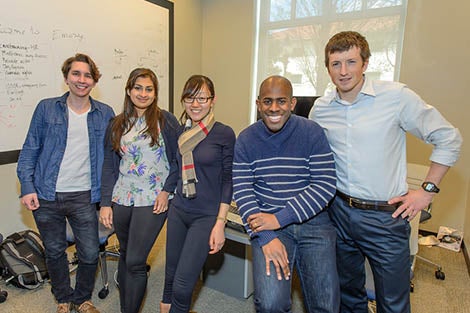April 20, 2016 — Say you’ve got $30 million to develop a five-year pilot plan for preventing and treating thousands of women in India who suffer from a serious childbirth-related injury called an obstetric fistula.
But you have just five days to come up with the plan.
That was the challenge that five Harvard graduate students faced—two from Harvard T.H. Chan School of Public Health and three from other Harvard schools—in a competition that drew 24 teams from around the world.
The teams met in early April at Emory University. Each team had received the global health “case,” provided by Emory’s Global Health Institute, the previous week. The teams were asked to present an innovative solution to the problem of obstetric fistula—a hole in the birth canal, caused by obstructed labor, that can lead to permanent incontinence if untreated. The condition disproportionately affects poor women in India, and social stigma often prevents them from seeking medical care or even discussing the problem.
The Harvard team that earned a spot in the Emory competition included master of public health student Jason Sarfo-Annin and doctoral epidemiology student Andrew Rothman, both from Harvard Chan School; Matthew Strickland and Namrata Turaga of Harvard Business School; and Ge Zhang, a chemistry student in the Graduate School of Arts and Sciences.
The team was chosen to compete in Atlanta because they’d won Harvard’s own global health case competition in February. That competition—which challenged students to produce a plan for ensuring adequate vaccine supply for the next pandemic flu, using a case developed by the Harvard Global Health Education and Learning Incubator—drew 58 students from around the university, competing on 10 teams.
For the Emory competition, teams received information about the case on April 4—and had until April 9 to finalize their presentations. The Harvard team spent hours conducting research, creating a 15-minute PowerPoint presentation, and practicing how to deliver a persuasive pitch.
Their mentor was Jack Rossin, who teaches a course at Harvard Chan on public speaking. At an April 6 evening practice session, Rossin offered the team members advice on how to streamline their presentation and make it compelling.
The students continued to work on the plane ride to Atlanta on April 7 and well into the night April 8. On April 9, they made their case to a two-judge panel of global health experts. The team’s proposal focused on the Indian state of Uttarakhand and included plans for better educating women about fistulas, improving women’s access to health care, and training more health workers in how to repair fistulas.
In the end, the Harvard team didn’t win. But they agreed—lack of sleep notwithstanding—that the experience was well worth it.
Said Strickland, “We got to do a deep dive on a fascinating issue, interact with people who bring different perspectives to a problem, and meet others interested in public health from institutions across the U.S. and the world.”
photo: Tony Benner
